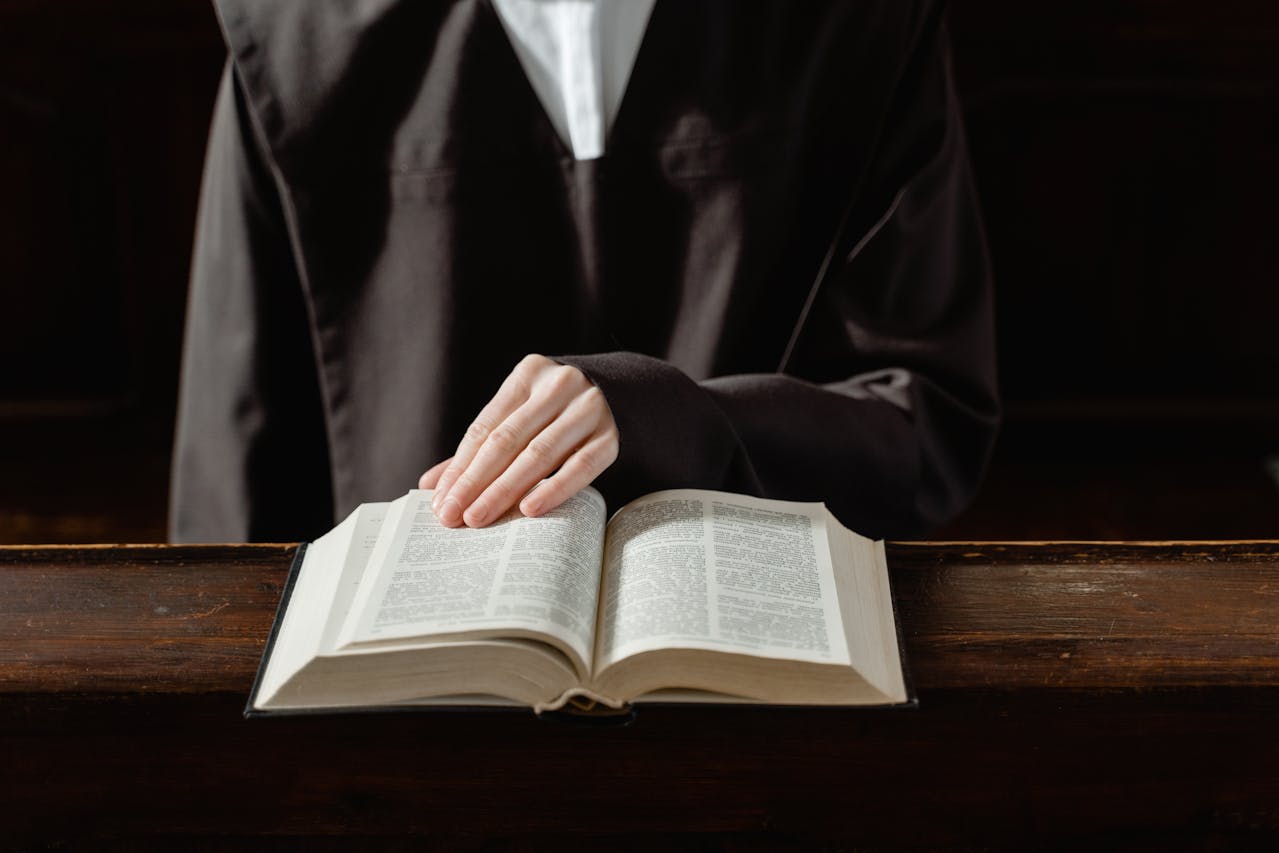

Introduction to Faith and Reason
Contents
The relationship between faith and reason has long been a subject of exploration and debate within Christian thought. Charles Haddon Spurgeon aptly captures the essence of this balance when he states, “Faith fortified by reason shines brightest.” This profound assertion suggests that while faith is essential for spiritual life, it is reason that gives it clarity and substance.
In today’s fast-paced world, achieving a fulfilled life hinges on our ability to harmonize these two significant elements. Faith provides us with a sense of purpose, guiding us through challenges and uncertainties. On the other hand, reason allows us to navigate life’s complexities with discernment and informed decision-making. Together, they create a robust framework for understanding both our spiritual beliefs and our everyday experiences.
The historical perspectives of early Christian thinkers like Augustine and Anselm further illuminate this discussion. Augustine famously stated, “I believe in order to understand,” emphasizing that faith precedes comprehension. Anselm built upon this notion with his emphasis on faith seeking understanding, advocating for a dynamic relationship where believers actively seek to understand their faith. This historical context underscores that the interplay between faith and reason is not merely a modern concern; it has deep roots in the foundation of Christian theology.
As we delve deeper into the intricacies of balancing faith and reason, we will uncover valuable insights that can guide us toward a more meaningful and fulfilled existence.
Biblical Insights on Reason
The verse from Isaiah 1:18 states, “Come now, and let us reason together, saith the LORD: though your sins be as scarlet, they shall be as white as snow; though they be red like crimson, they shall be as wool.” This powerful invitation from God emphasizes the importance of both reasoning and repentance. At a time when the nation of Judah had strayed from God, engaging in corrupt practices and empty rituals, this verse serves as a call for reconciliation and renewal.
The imagery presented in Isaiah is striking. The mention of “scarlet sins” symbolizes profound guilt, while the transformation into “white as snow” signifies complete forgiveness and purity. This passage encourages individuals to acknowledge their shortcomings and embrace God’s grace, which offers a transformation that surpasses human capability. It highlights the essential nature of reasoning in understanding one’s own state and the divine invitation to seek redemption.
Moreover, the Bible continually encourages believers to engage their minds in the pursuit of faith. For instance, Proverbs 2:6 reminds us that “the Lord giveth wisdom: out of his mouth cometh knowledge and understanding.” This underscores the fact that faith and reason are not opposing forces; instead, they work together to deepen our understanding of God and His teachings. In 1 Peter 3:15, Christians are urged to always be ready to provide a reason for their hope, further emphasizing that a thoughtful approach to faith enriches our spiritual journey.
Historical Perspectives
St. Augustine of Hippo, a pivotal figure in early Christian thought, articulated a profound relationship between faith and reason, famously stating, “To reason is to believe.” This quote reflects Augustine’s journey in his influential work, Confessions, where he explores the intersection of intellect and divine truth. Augustine contended that while reason can draw individuals toward God, it is faith that ultimately reveals the fullness of divine understanding. His insights challenge the misconception that faith is irrational, asserting instead that both faith and reason originate from the same divine source.
Augustine acknowledged the limitations of human reason, impacted by the Fall, which distorts our understanding. However, he maintained that reason plays a crucial role in recognizing the coherence and logic of belief. This perspective has significantly shaped Christian theology, encouraging believers to engage their minds alongside their hearts in the spiritual journey.
Similarly, Anselm of Canterbury contributed to this discourse with his statement, “I believe in order to understand.” Anselm posited that faith serves as a necessary precursor to genuine understanding. His philosophy emphasizes that human reason alone cannot fully grasp divine mysteries; rather, faith lays the groundwork for deeper comprehension. Anselm’s ideas, particularly his ontological argument for God’s existence, illustrate how faith and reason complement each other. This interplay between belief and understanding has had a lasting impact on Christian thought, reinforcing the notion that doubts and questions can lead to a more profound grasp of spiritual truths.
Victorian Evangelicalism and Reason
Anthony Carter’s journal on Reason in Victorian Evangelicalism provides an in-depth look at how faith was intertwined with reason during this transformative period. He situates Victorian Evangelicalism within the socio-political landscape of the 19th century, illustrating its response to significant events like industrialization and social upheaval. One of his key points is the emphasis on personal faith and the authority of Scripture, which were cornerstones of Evangelical belief. This movement not only encouraged individual conversion experiences but also played a pivotal role in social reform efforts, such as abolitionism and education.
Carter’s work highlights the cultural contributions of Evangelicals, showcasing how they shaped literature, music, and public life. However, he doesn’t shy away from discussing the challenges faced by the movement, including theological debates and critiques from a growing secular society. His reflections on the legacy of Victorian Evangelicalism reveal its lasting impact on contemporary faith practices, emphasizing its relevance even in modern discussions of spirituality.
Balance of Faith and Reason
The Victorian era was a time marked by a strong Christian presence that influenced social and political life, yet it was also an age of remarkable scientific advancement. Many Victorians sought to balance their faith with new scientific discoveries. For instance, the challenges posed by Darwin’s theory of evolution prompted some to explore the idea of intelligent design, suggesting that the complexity of nature indicated a divine creator.
This interplay between faith and reason was evident in various movements, including Nonconformist sects that aimed to make religion more accessible, especially to the working class. Intellectual debates flourished, with figures like David Strauss questioning traditional beliefs, while the Tractarian movement sought to reaffirm faith amidst modern challenges. The result was a unique tapestry of thought, where individuals and movements strived to reconcile their spiritual beliefs with the rational inquiries of their time.
C.S. Lewis on Faith and Reason
C.S. Lewis offers profound insights into the relationship between faith and reason, particularly in his influential work Mere Christianity. In this book, he emphasizes that faith should not exist in a vacuum; rather, it must be anchored in rational thought. Lewis argues that if one’s reasoning leads them to believe that Christianity is false, then they should not accept it. This insistence on a rational foundation sets him apart from the more dogmatic approaches of his time.
Mere Christianity
In Mere Christianity, Lewis presents a logical framework for understanding Christian beliefs, systematically addressing common objections. He argues that the moral law, which he describes as a universal truth, points to a divine lawgiver. By doing so, he provides a compelling argument for the existence of God that intertwines faith with reason. Lewis critiques naturalism, asserting that it fails to account for the validity of human reasoning. He posits that if there is no divine source of reason, then reasoning itself becomes unreliable.
Lewis also recognizes that doubts often stem from emotional rather than intellectual challenges. He encourages believers to remain steadfast in their faith, even when faced with emotional turmoil. By acknowledging the complexity of human experience, Lewis presents a nuanced view that respects the interplay between faith and reason. This balance is essential for a faith that can withstand both intellectual scrutiny and emotional struggles, making Lewis’s work a vital resource for those navigating their spiritual journeys.

Contemporary Relevance
The balance between faith and reason has become increasingly relevant in our modern society. As individuals navigate complex issues, the interplay of both elements shapes our understanding of knowledge and informs our daily decisions. In an age where the perception often sees faith as subjective and reason as objective, finding harmony between these two can enhance our pursuit of truth.
Faith and reason are not mutually exclusive; rather, they can coexist to enrich our experiences. Here are some examples of how this balance is achieved today:
Everyday Acts of Faith: Trusting a bank with your savings or choosing a restaurant involves faith based on past experiences and institutional credibility. These decisions illustrate that faith is often grounded in rational judgment.
Knowledge Acquisition: We rely on credible sources—books, journalism, and experts—to gain knowledge. This reliance demonstrates that faith in information is reinforced by reasoned trust.
Interpersonal Relationships: Navigating friendships and family dynamics requires a different reasoning approach than scientific inquiry. Wisdom in these areas relies on emotional understanding and nuanced judgment.
Diverse Modes of Reasoning: Different fields, such as psychology and theology, require distinct reasoning methods. Recognizing these variations is essential for a comprehensive understanding of reality.
“Faith is not blind; it is informed by reason, guiding our choices and interactions every day.”
Challenges persist in achieving this balance, especially when faith encounters contemporary ethical dilemmas or scientific critiques. Issues such as the perceived conflict between faith and science or the problem of evil can complicate the relationship between faith and reason. However, navigating these challenges requires an open mind and a willingness to engage with both faith and reason. By embracing their interplay, we can cultivate a more profound understanding of truth that enhances our lives.
FAQ on Faith and Reason
Balancing faith and reason can raise many questions. Here are some common queries along with concise answers to help clarify this vital relationship.
Q1: Can faith and reason coexist?
Yes, faith and reason can coexist harmoniously. Many believe that both are essential for a comprehensive understanding of truth. While reason provides a framework for understanding the world, faith can offer insights into the spiritual dimensions that reason alone may not fully grasp. This perspective is supported by the Catholic view that emphasizes the importance of both in intellectual pursuits.
Q2: How can I apply reason to my faith?
Applying reason to faith involves critically examining beliefs and seeking understanding through study and contemplation. For instance, engaging with theological texts, participating in discussions, or exploring philosophical arguments can help deepen your faith while maintaining a rational perspective. This approach aligns with the idea that faith is informed by reason, as individuals make judgments based on credible sources.
Q3: What challenges do faith and reason face today?
Several challenges impact the balance between faith and reason in contemporary society. Issues such as the perceived conflict with science, ethical dilemmas surrounding biblical narratives, and the problem of evil can complicate the relationship. Addressing these challenges requires an open dialogue that respects both faith and rational inquiry.
Q4: How can I foster a better balance of faith and reason in my life?
To nurture this balance, engage with a variety of knowledge sources, including academic and spiritual teachings. Recognize that faith can inform your understanding of moral and ethical issues, while reason can guide your decision-making process. Embracing diverse modes of reasoning—philosophical, theological, and empirical—can enrich your pursuit of truth, as highlighted in discussions about different reasoning modes.
By addressing these common questions, we can further explore the vital interplay of faith and reason, especially as we navigate the complexities of modern life.
Summary Table
To better understand the key insights regarding the balance of faith and reason, the following table summarizes the main points discussed in this article. This overview highlights the relevance of faith and reason in various contexts, along with their historical implications.
|
Topic |
Key Insight |
Historical Reference |
|---|---|---|
|
Introduction to Faith and Reason |
Balancing faith and reason leads to a fulfilled life. |
Augustine, Anselm |
|
Biblical Insights on Reason |
The Bible encourages reasoning as part of faith. | |
|
Historical Perspectives |
Faith complements reason, aiding in understanding God. |
Augustine, Aquinas |
|
Victorian Evangelicalism and Reason |
Emphasized the integration of faith and reason. | |
|
C.S. Lewis on Faith and Reason |
Argued for the coexistence of faith and reason. | |
|
Contemporary Relevance |
Faith and reason shape modern understanding and decisions. |
This table encapsulates the essential elements discussed in each section, illustrating the interconnectedness of faith and reason through historical and contemporary lenses. Understanding these insights fosters a deeper appreciation of how this balance can enrich our lives today.

Conclusion
In exploring the balance between faith and reason, we have uncovered vital insights that resonate deeply in both historical and contemporary contexts. The relationship between these two realms is not merely academic; it shapes how we approach knowledge, make decisions, and engage with the world around us. As Spurgeon wisely noted, faith fortified by reason shines brightest, underscoring the necessity of integrating both aspects in our pursuit of truth.
Modern thought often separates faith and reason into distinct spheres. Yet, this dichotomy can hinder our understanding and appreciation of the complexities of life. Recognizing that faith is often informed by reason—whether through trusting credible sources or engaging in interpersonal relationships—highlights the importance of this balance. For instance, our everyday acts of faith, such as trusting institutions or navigating relationships, rely on a foundation of reasoned judgment, as discussed in everyday acts of faith.
Moreover, challenges to faith, such as the perceived conflict with science or the problem of evil, reflect the necessity of a nuanced understanding that includes both faith and reason. The challenges faced in contemporary contexts emphasize that intellectual integrity requires acknowledging the strengths and weaknesses of all worldviews.
Ultimately, achieving a balance between faith and reason is essential for a fulfilling life. It encourages us to embrace a holistic view of knowledge, enriching our spiritual journeys and enhancing our interactions with others. As you reflect on your own life, consider how you can integrate both faith and reason in your daily decisions and beliefs. This synergy can lead to a deeper understanding of truth and a more meaningful existence.
Contact us and grow with us. Connect with us on
Youtube, Facebook, and LinkedIn. We hope to see you soon!